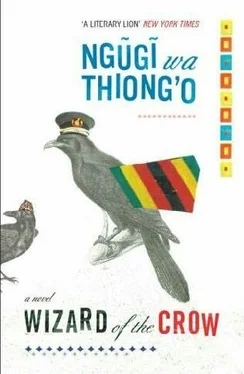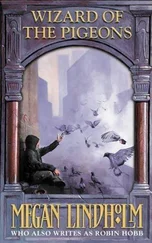Have I fallen so low? How did I come to this: letting another man dictate to me what I can or cannot do in my own house? Beg another man to give me permission to discipline my wife? He need not refer to her connection to the dancers, for that indeed might interfere with state security investigations, but beating her was his male prerogative and he was not about to cede that right to another bull in the kraal. Why had he not thought about it in these terms before?
He did not wait for his breakfast. He drove back home like one crazed. As he entered the house his fists were already clenched.
People say that women all over Aburlria, Nyawlra among them, could hear Vinjinia’s screaming.
Just before they put him on the plane for America, Kahiga and Njoya brought the Wizard of the Crow back to the shrine to change into fresh clothes and to say good-bye to his companion. They took care to impress upon her that the wizard’s impending visit to America had prompted their first appearance but they could not then have disclosed this because they had been sworn to secrecy. He was needed in New York, they told her, to use his magic to strengthen the hand of the Aburirian negotiators while softening the hearts of the directors of the Global Bank to make them release the funds for Marching to Heaven. But Nyawlra was not fooled by their exaggerated claims, and she genuinely feared for Kamltl. Stories of people abducted by the police in broad daylight, tortured, and left in the wild as food for hyenas, were many. Even when Kahiga and Njoya phoned her to tell her that all had gone well, she hardly felt reassured, and she reminded them that she would hold them accountable for whatever happened to the Wizard of the Crow.
Several days later, Kahiga and Njoya came to see her at the shrine and presented her with a small jewelry box. They stood around her with self-satisfied smiles as she opened it. She almost collapsed but retained her composure.
“Why have you brought me hair in a box?” she asked, fearing the worst.
“It belongs to the Wizard of the Crow,” Kahiga explained.
Nyawlra suddenly recalled her threat and felt like laughing. But this was not a laughing matter. Why did they bring his hair to her now, and in a box? What did it really mean? Was it a casual joke? Was Kamrö dead after all?
She felt better only after she received a call from Kamrö to say that he had arrived in New York safely. He sounded rushed but he promised to call again, and when she did not hear from him soon, she began to worry. Their forced separation gave her the time to reflect. She and Kamrö did not always see eye to eye, particularly in matters of ideology and practical politics. Kamltl’s suspicions of organization and the discipline involved was opposite of her belief that organization was the only way by which people could effect meaningful changes. Agonize less; organize more! But despite the fact that she belonged to an organization and Kamrö did not, they were united by a shared belief in the humanity of people and service to community, and they differed only in the means of getting there. All in all, theirs was the firmest of bonds.
She missed him and their conversation terribly. Playing her guitar was often her refuge in such moments, but these days she could not even pluck the strings. What else to do? Long ago in school and later at college Nyawlra had kept a diary off and on. She resumed it. Writing made her feel better, almost as if she had talked to the spirit of her absent love. One night she tried to account for what she called her political catechism.
“I believe that black has been oppressed by white; female by male; peasant by landlord; and worker by lord of capital. It follows from this that the black female worker and peasant is most oppressed. She is oppressed on account of her color like all black people in the world; she is oppressed on account of her gender like all women in the world; and she is exploited and oppressed on account of her class like all workers and peasants in the world. Three burdens she has to carry. Those who want to fight for the people in the nation and in the world must struggle for the unity and rights of the working class in their own country; fight against all discriminations based on race, ethnicity, color, and belief systems; they must struggle against all gender-based inequalities and therefore fight for the rights of women in the home, the family, the nation, and the world…”
No, those were not the words in the catechism she had in mind. For whom am I writing this, anyway? she asked, and tore it to pieces.
The more she missed Kamltl and feared for his safety, the more she applied herself to organizing and healing. Involvement in other people’s suffering turned out to be the best way of coping with her personal woes, for she was able to see that these woes were not peculiar to her situation but were shared by many others.
Early one morning a woman came to see her. The woman wore a veil. A Muslim, Nyawlra thought as she received her in the chamber they had come to call the confessional. She tried to read the woman’s face, but how does one read a veiled face? Even so, she could see that the woman’s eyes were flush with sadness.
“Mother, what brings you to the shrine of the Wizard of the Crow?” Nyawlra asked her.
When she tried to answer the woman broke down and sobbed, tears flowing down her cheeks. Nyawlra waited patiently to give the woman time to recover her composure. Then the woman removed the shawl that covered her head and face. Vinjinia? Nyawlra almost forgot her own guise as the Wizard of the Crow and stopped just short of shouting the name. The face behind the veil was so swollen that the eyes were almost shut. In shock, Nyawlra did not press for a reason for the visit. She attempted no small talk, and neither did she remind her of her last visit to the shrine to seek help in finding her missing husband. She would allow Vinjinia the right to reveal as much as she wished. Nyawlra knew of visitors to the shrine who came repeatedly, each time pretending that it was their first visit. But Vin-jinia seemed too overwhelmed with sorrow to speak.
“What is the matter, woman? Did a beast attack you, or what?” Nyawlra finally asked to break the long silence.
“The beast has a name. It is called a husband. Night and day. Quarrels without reason. Fights without a truce. Marriage is a prison. Prison for life, more so when a couple has children. Even our religions sanction the prison for life for a woman.”
“The times we now live in are different from the ones gone,” Nyawlra said. “Today one can walk freely out of this prison if one so wants. Even in the past women could always go back to their parents or choose to live on their own. There were women who married other women, even.”
“Why should I walk out and leave a home we have built together?” Vinjinia asked.
“I am not asking you to wreck your home.”
“There is no home left to wreck. He has already done that by his actions!”
“What did he do?” Nyawlra asked. “What was he demanding from you? Sex?”
Vinjinia paused as if she was not quite sure where or how to begin. Should she leave out the more shameful details?
“If you want my help, you must tell me everything,” Nyawlra said, as if she had read the mind of her client. “Even if he tried to rape you. Rape is rape, even when done by a friend or a husband.”
Vinjinia felt relieved of the burden of editing her story. She went so far as to reveal her name and reminded the wizard that she had been to the shrine on two previous occasions. Her needs had been met, and that’s why she had come back yet a third time. She was unstinting in recalling all that had happened in her home since Tajirika’s return.
Читать дальше












